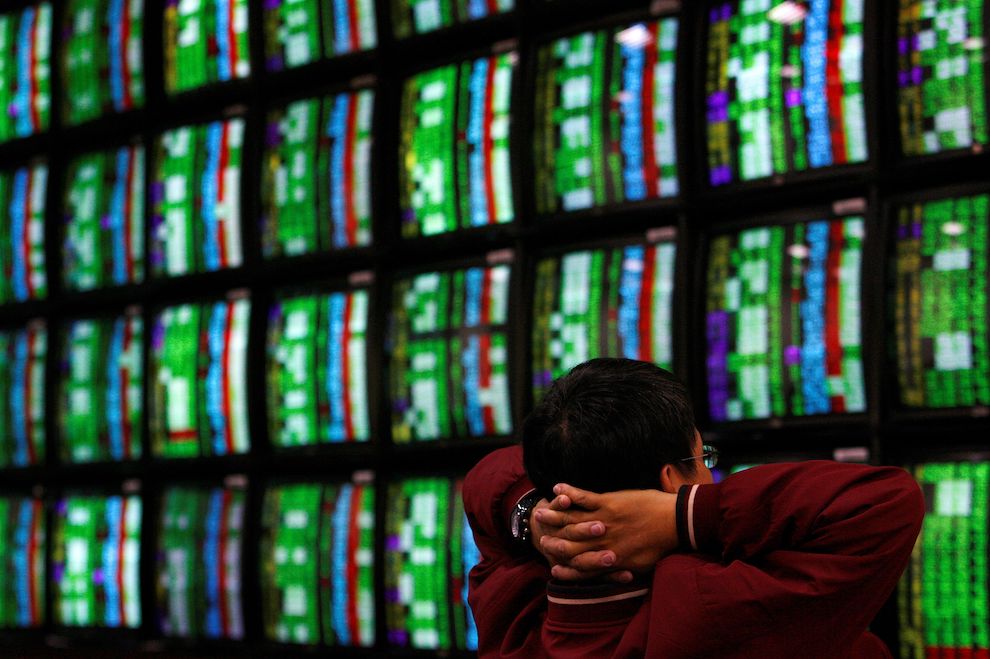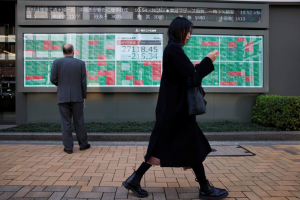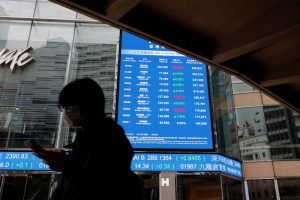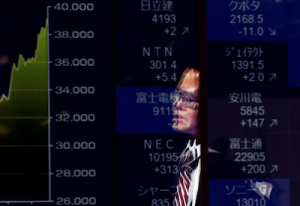Asian stocks sank on Monday as shock US inflation data sparked fears of more aggressive interest rate hikes by the Federal Reserve, while news that Chinese authorities had ordered more mass testing for Covid in Beijing added to concerns over further lockdowns.
The Nikkei posted its biggest drop in over four months to end at a two-week low, with heightened expectations about US rate hikes driving the yen to a 24-year low against the dollar.
Chinese stocks also fell on Covid uncertainties and worry that the US Fed could cause a sharp slowdown by tightening policy.
MSCI’s benchmark Asia-Pacific equity index slumped 2.66%. And stock weakness was expected to extend into US and European trading, with futures pointing to a 1.67% drop for the S&P 500, a 1.4% retreat for Germany’s DAX and a 0.77% slide for Britain’s FTSE.
Meanwhile, bitcoin, the leading cryptocurrency, slumped to its lowest level since December 2020.
ALSO SEE: Bitcoin Hits 18-Month Low as Celsius Halts Withdrawals
‘Black Monday’
“It is turning into a Black Monday in Asia,” Jeffrey Halley, senior market analyst at Oanda, wrote in a client note.
“The R-word (is) now on everyone’s lips” amid “a scramble to reassess Fed hiking expectations,” he wrote.
Focus in Asia was on the risk of fresh Covid lockdowns with Beijing’s most populous district of Chaoyang announcing three rounds of mass testing to quell a “ferocious” outbreak that emerged at a bar.
Shanghai conducted mass testing to contain a jump in cases tied to a hair salon.
Chinese blue chips dropped 1.42% and Hong Kong’s Hang Seng suffered a 3.29% slide.
Japan’s Nikkei slumped 3.03% and South Korea’s Kospi declined 3.27%. Australian markets were closed for a holiday.
Chip-making equipment maker Tokyo Electron fell 5.26% and was the biggest drag on the Nikkei, followed by technology investors SoftBank Group, which tanked 6.85%. Air-conditioner maker Daikin Industries lost 4.61% and a robot maker Fanuc fell 3.64%.
“Anyone trying to pick the bottom in China’s growth and equity markets on the basis that China was ‘one and done’ on lockdowns is naive,” Oanda’s Halley said.
China’s Growth shares sagged, with tech giants listed in Hong Kong slumping 4.45%. Index heavyweights Alibaba, Tencent and Meituan were each down between 4% and 6%.
New bank lending in China jumped far more than expected in May and broader credit growth also quickened as Beijing steps up policy support. However, 38% of the new monthly loans were in the form of short-term bill financing, suggesting real credit demand remains weak.
BoJ Tolerance Limit
In currency markets, the dollar climbed as high as 135.22 yen, its highest since October 1998, buoyed by a rise in Treasury yields that continued into Tokyo trading.
The 10-year reached a more than one-month peak of 3.202%, putting it just a tenth of a basis point from the highest since November 2018.
That put upward pressure of Japanese government bond yields, with the 10-year pushing to a six-year high of 0.255%, half a basis point above the Bank of Japan’s 0.25% tolerance limit under its yield curve control policy. That’s even amid the BOJ’s standing offer to buy unlimited amounts of the 10-year note since April.
The breach of its ceiling spurred the central bank to announce an additional, unscheduled purchase operation.
The US consumer price index increased a bigger-than-expected 8.6% last month, the largest year-on-year increase since December 1981, data showed on Friday.
That dashed hopes that inflation had peaked and instead put markets on alert that the Fed may tighten policy for too long and cause a sharp economic slowdown. The next policy decision is on Wednesday.
50bp Hike Tipped
“The inflation data are game changers that force the Fed to switch to a higher gear, front-loading policy tightening,” Jefferies strategist Aneta Markowska wrote in a research note, lifting a call for this week’s decision to a 75 basis point hike.
Markets currently price 80% odds of a half point increase, and 20% odds for 75 basis points.
Two-year Treasury yields, which are very sensitive to policy expectations, leapt as high as 3.194% in Tokyo on Monday, a first since December 2007.
The US dollar index, which measures the currency against six major peers including the yen, ticked as high as 104.58 for the first time in almost a month.
The euro slid as low as $1.04755 for the first time since May 19.
Meanwhile, crude oil dropped, with Brent crude futures down $1.81, or 1.48%, to $120.20 a barrel and US West Texas Intermediate crude at $118.81 a barrel, down $1.86, or 1.54%.
• Reuters with additional editing by Jim Pollard
ALSO on AF:
Millions Face Testing as Beijing Races to Contain Bar Outbreak
Yen Dives to 24-Year Low as Kuroda Warns on Economic Impact
Chinese Mobile Gaming Firms Rake in $2.3bn in May – Xinhua
























